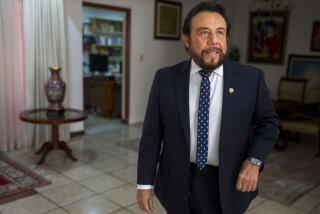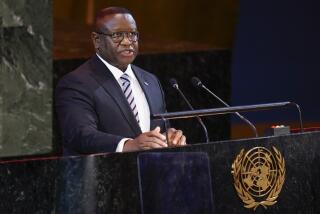Nigeria Polishes Image as it Fights a Nearby Coup
- Share via
NAIROBI, Kenya — Nigeria’s current efforts to reinstate the ousted civilian government of Sierra Leone and restore democracy to that impoverished West African nation carry a certain irony: Nigeria is ruled by a military regime that itself took power by force in 1993 and has no credibility as a defender of democracy.
But Africa’s most populous nation is trying to clean up its reputation as a bastion of political and social injustice. Nigerian strongman Gen. Sani Abacha is believed to be laying the groundwork for a campaign as a civilian presidential candidate in scheduled fall elections. And with the largest army in sub-Saharan Africa, he is trying to ensure his country’s status as a regional power broker.
“The Nigerians are very much aware of how the outside world is looking at their role in Sierra Leone,” said Adonis Hoffman, a senior fellow at the New York-based World Policy Institute. “They are ready to establish themselves as the premier and principal military power in the West African region. And they have something to prove by showing that even though they are having their own internal bout with democracy . . . Nigeria wants to be seen as a supporter of democracy.”
Since the bloody May 25 coup that toppled Sierra Leone President Ahmad Tejan Kabbah, Nigeria has sent more than 2,000 troops to the country, ignoring warnings by the coup leaders not to interfere.
The Nigerian troops’ initial battle against the Armed Forces Revolutionary Council, a band of mutinous junior military officers, was unsuccessful; the Nigerians were outnumbered and outgunned. The Sierra Leone rebels reportedly captured about 300 Nigerian soldiers, threatening to use them as human shields against air bombardments in Freetown, Sierra Leone’s capital.
Nigeria, which leads a regional peacekeeping force sponsored by the Economic Community of West African States, already had several hundred troops posted in Sierra Leone as part of a defense agreement between the two countries. In 1990, the peacekeeping force was sent to help defuse the civil war in neighboring Liberia, bolstering the Nigerians’ developing image as peacekeepers.
“The Nigerians have played a key role in [peacekeeping] operations worldwide,” including in Somalia, Hoffman noted.
“It would be a feather in their cap if they can say to the international community that ‘We’ve . . . stood up for democracy at great costs.’ They could point to a track record, although short, as defenders of democracy in West Africa.”
Though Nigeria is on America’s list of drug-trafficking nations, the State Department has said it welcomes efforts to stabilize security in Freetown and has noted that the successful evacuation of U.S. and foreign citizens from the capital owed much to Nigeria and its armed forces.
The coup in Sierra Leone--that nation’s third in five years--has provoked international condemnation.
The United States has joined the Organization of African Unity and the United Nations in calling for Kabbah’s restoration.
Nigeria’s stand for democracy must be judged in the context of its shady recent history. Abacha seized power in Nigeria in 1993 after the military annulled elections in which Moshood Abiola, a civilian, was widely presumed to have won the presidency.
Those elections would have ended 10 years of army rule. Instead, Abiola landed in jail on sedition-related charges.
The military government has been shunned by Western nations for widespread human rights violations, political assassinations, tolerance of drug trafficking and stifling of basic political freedoms.
Some observers believe that Abacha’s motives for reinstating the Sierra Leone president, who has taken refuge in neighboring Guinea, are purely self-serving. Analysts say the Nigerian general, having thoroughly intimidated any significant opposition, could win as a civilian presidential candidate and is sending a clear and early message to his army: Overthrowing a civilian regime is, suddenly, not a good thing to do.
“It’s an insurance policy for himself,” said Ahmed Rajad, editor of the London-based newsletter Africa Analysis.
By promising to establish civilian rule eventually and appearing to champion democracy in neighboring nations, Rajad said, Abacha makes it harder for the international community to condemn his undemocratic practices at home.
Abacha’s personal motives aside, Nigeria has reasons to want stability in the region. It is a key economic player in West Africa, and any upheaval on its side of the continent could have devastating financial repercussions for Nigeria.
Neither does Nigeria want to risk a flood of refugees across its borders from nearby war-torn nations such as Sierra Leone. Much as the U.S. has used the Monroe Doctrine to justify protecting what it claims as its sphere of influence, Nigeria could be said to be intervening in Sierra Leone to protect its national interests.
Ghana and Guinea have also contributed troops to help Nigeria in Sierra Leone--part of a growing trend among African nations to take the initiative in solving the continent’s problems themselves.
In recent months, South African President Nelson Mandela played mediator in trying to solve the crisis in Zaire (now renamed the Democratic Republic of Congo). The presidents of Uganda and Rwanda also offered Zaire diplomatic and military support.
“It is very encouraging to see African nations take the leadership role in these conflicts,” Hoffman said.
More to Read
Sign up for Essential California
The most important California stories and recommendations in your inbox every morning.
You may occasionally receive promotional content from the Los Angeles Times.











